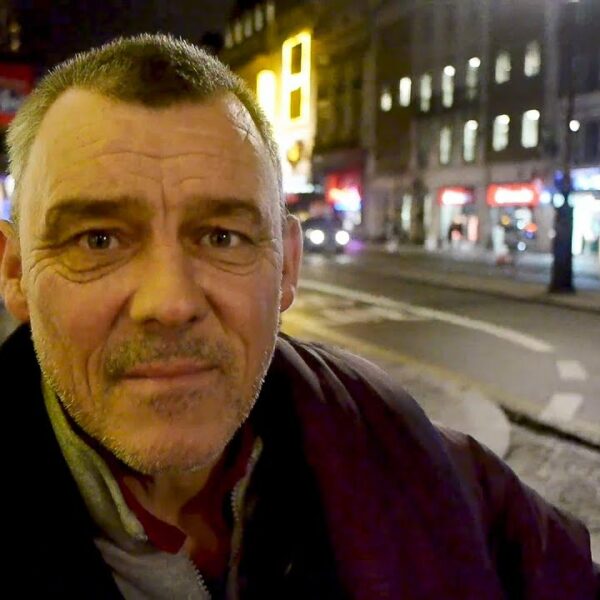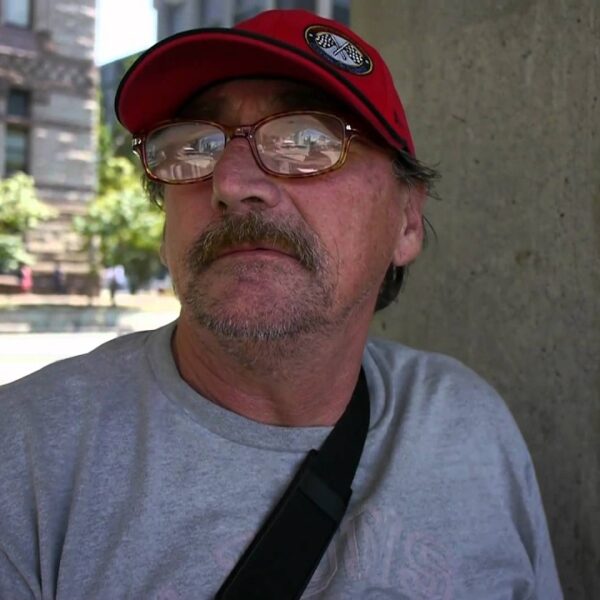It can sometimes to be hard to put pen to paper when the subject hits close to home. While capturing one’s passions might provide the motivating ammunition one needs to tell a story, raise their voice, and shift a narrative … sometimes, the wounds are still too fresh. Sometimes, it hurts a little more. Sometimes, the subject reflects our own failures.
And sometimes, we reflect on how we didn’t do enough.
This column isn’t just a profile of yet another homeless person who society allowed to get lost in the shuffle. This article isn’t just another rallying cry for a change in our social welfare systems.
No. This one is also a confession.
In my city, we took for granted that Donnie would always be there … until he wasn’t.
Donald Armstrong was a fixture in Brockville for both good and bad reasons, depending on who was doing the talking.
To some, Donnie was aggressive, angry, volatile, and hard. With his chest pushed out, and his arms in an outstretched shape, as to convey machismo. To those who saw him this way, the stories would range from anger to muted sympathy for someone that many felt isolated himself from others and pushed people away.
To others, Donnie was a watchful guardian of Brockville’s downtown corridor. Quiet, unassuming, and often hidden in the shadows. Mostly cordial, always grateful, and very modest. Donnie would always compliment my mother’s long hair, and say hello to my dog, Rufus. He always shook my hand firmly, and often bragged about how good he looked in a sweatshirt or jacket that I would save for him when doing outreach with the Brockville Streetfriends.
To some, he was intimidating, loud, and forceful. To me, he was a man battling demons, in recovery, grateful to be alive … until he wasn’t.
He was my friend.
And one day, he was gone.
“The last time I saw Donnie, about a week before he passed, he didn’t seem quite himself and looked unwell,” said Mark Darrah of the Brockville Streetfriends collective. “He said that someone gave him ‘something’ the day before, but he wasn’t sure what it was. He hadn’t felt well since.”
Mark continued, “He assured me he’d be fine.” But unfortunately that was ultimately not the case.
Recalling his interactions with Donald in the months before his tragic passing, Mark admits that he never saw the aggressive side of someone struggling with his mental health and addictions. All he saw was a staple of Brockville’s downtown, who was always eager to interact. Someone who always valued small acts of kindness.
“Donnie was incredibly kind,” Mark said. “He appreciated everything that people did for him, and always sought to protect vulnerable people he shared the streets with.”
Recalling stories of Donald interrupting fights on street corners, and walking local female bartenders’ home after their shifts, Mark divulged that the Donald he had come to know in the year prior did not appear to be the rough and tumble character that some still remember.
“He made people laugh,” chuckled Mark. “Even when his own situation was rather grim.”
With a muted pause, Mark said, “the streets of Brockville are darker and colder without him.”
There was no obituary outlining the people that Donald left behind. No funeral home celebration. And more questions than answers, but so few even seemed to be asking.

With heartbreak on our lips, it was his friends who would organize his celebration of life. And instead of doing it at a fancy reception hall like so many before it, this one hit differently. As swaths of people crowded around a downtown parkette in front of a park bench that Donald too often called home, a solemn call to action filled the air.
Dressed in surgical masks, and wearing gloves, a collection of friends Donald may not ever have known he even had, circled around pictures, scrapbooks, candles and teddy bears. Together, we recalled the gentle giant that was lost to the abyss of homelessness.
Many of us, like me, took for granted that he would always be there to greet us.
“The celebration of his life was incredibly moving,” Mark recalled, smiling. “As so many people stepped forward to tell stories of his kindness, strength, and sense of humour, it was overwhelming.”
And Donald’s passing would not be in vain.
In the wake of Don’s passing, organizations like the United Way received cash donations in his honour. Activist groups like the Brockville Overdose Outreach Network and the aforementioned Brockville Streetfriends were quite suddenly inundated with messages of shock at the loss of Don. But shock was not all. Generous donations and offers of support piled in, stretching the capacity of these volunteer groups beyond what many ever anticipated.
“Our elevated profile even inspired other people and groups to start similar efforts,” Mark said. “Now more than ever, people are hard at work to ensure that we don’t lose another member of our community.”
And as beautiful and powerful as that legacy is, the need continues to explode in the wake of COVID-19. With tent encampments popping up behind movie theatres and under overpasses, there has never been a time like this for the picturesque small urban community. Pitted in the heart of a rural landscape, and acting as a hotbed of local services, there continues to be a call to action to combat the potential losses still to come.
No amount of honouring legacies will make up for the fact that one of us is already gone. And no amount of pretending will make this issue go away.
As the numbers of overdose deaths continue to climb, and as the cost of living does as well, reliance on familiar coping mechanisms make the realities of poverty more prevalent than ever. Brockville joins so many other communities in turning its eyes to warming centres, housing task forces, and municipal drug strategies. There is still hope for a more equitable and just tomorrow.
Sometimes, it takes a number of tragedies to unite us around the changes we need to make.
But the issue of homelessness in rural and remote communities is in no way a new problem. It’s just becoming harder to ignore than ever before.
Rest peacefully, Donald.













